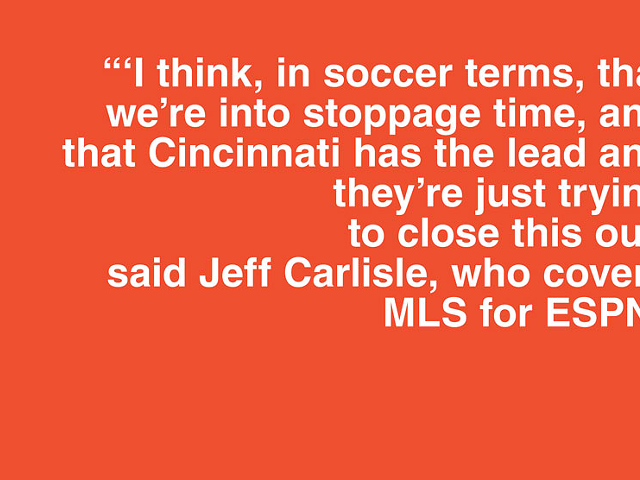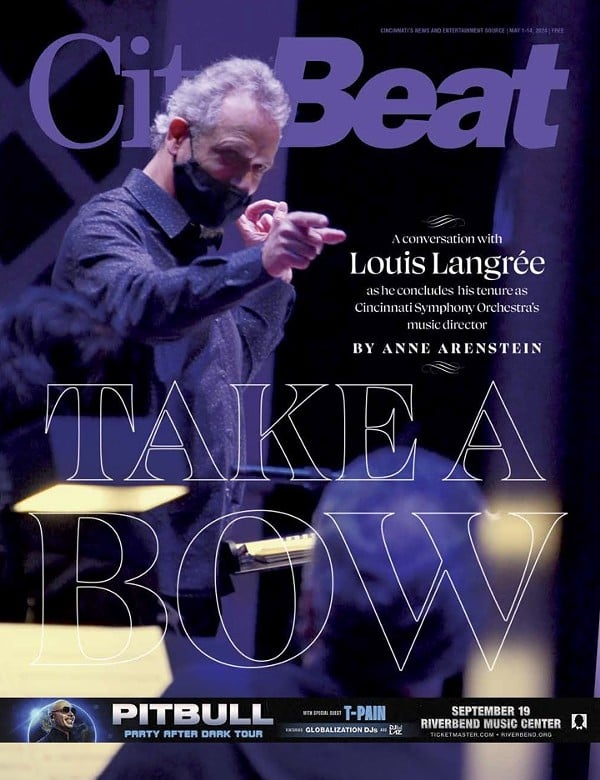Hello Cincy. Got a minute for some news? Rad. Let’s get to it.
Welcome to the latest installment of our soccer-themed soap opera, As the Ball Turns. If you missed last episode, let me get you up to speed. FC Cincinnati was caught courting a neighborhood other than once-favored Oakley, sending letters to Cincinnati Public Schools about a possible soccer stadium in the West End at the site of Taft High School’s Stargel Stadium. Cincinnati Business Courier reported that the team had even signed a purchase option on land owned by the Cincinnati Metropolitan Housing Authority in the neighborhood, including plots next to several homes there.
Alas, it turns out that FCC did not reach out to West Enders first, and now the neighborhood’s community council says residents feel “disrespected and ignored” by the team. Who could have guessed that preliminary plans to build a $200 million stadium plus parking garages and other needed extras near homes and a public school without any community outreach would prove alarming to a neighborhood that has a history of getting an extremely raw deal when it comes to development? Community Council President Keith Blake told the Cincinnati Enquirer that the potential stadium could “impact a lot of plans” the community has already laid.
Meanwhile, FCC’s Jeff Berding says the team actually hasn’t signed a purchase option on the land. Berding also says reaching out to CPS was just the team doing necessary groundwork to keep the West End open as an option. Berding pledged that Oakley was still the preferred site for the team, but that it’s waiting to hear back about traffic studies that will measure the potential impact of a stadium there. The FCC GM also promised the team would do robust community engagement in whatever neighborhood it selects.
• Of course, all that hinges on FCC getting a Major League Soccer expansion franchise. So, yeah, when will we find out about that, again? Probably not until February. You may be able to blame the New England Patriots for that one. As it turns out, Patriots President Jonathan Kraft is also chairman of the MLS’ expansion committee. The Pats, owned by Kraft’s father Robert, scored a big win Sunday and are Super Bowl-bound. That means Kraft will likely have his attention trained on American football for the next couple weeks. We’re not Europe just yet, it seems.
• Cincinnati-based grocery giant Kroger is mulling an alliance with Chinese online retailer Alibaba in order to stave off competition from ecommerce juggernaut Amazon, according to media reports. While details of that partnership haven’t been released, Kroger execs met with Alibaba leadership last month in China to discuss plans, Reuters reports. Among the possible ways the two could cooperate: Kroger could use technology called Alipay to give customers an app-based payment options, allowing shoppers to skip lines.
• Earlier this month, President Donald Trump announced a 30 percent tariff on solar cells manufactured outside the United States. Will that slow local green energy initiatives? Probably not much, at least according to one local solar energy leader. The tariff will mean a five percent increase in the cost of solar panels locally, says Solarize Cincy Director Rob McCraken. That’s not a huge boost, he says, and likely would only make a real impact on big projects. The technology has proven popular here. Hamilton County has more residential solar panels than any other county in Ohio.
• Need a measure of how much the Ohio Republican Party has changed in the wake of the 2016 election? Gov. John Kasich’s own Lt. Gov., Mary Taylor, is working hard to distance herself from the Big Queso. Taylor, currently in the middle of her own campaign to replace term-limited Kasich, told reporters recently that she hasn’t talked with the former Republican presidential primary hopeful in over a year. That’s not exactly true, Kasich says. His office released a calendar showing the two have met eight times in the past 12 months. But accurate or not, it shows that Kasich, a vocal opponent of President Donald Trump, is seen as a liability by his party mates vying for the state’s highest office. Trump did well in Ohio, after all.
• How are the students once enrolled in shuttered online charter the Electronic Classroom of Tomorrow faring in finding other schools? They’re starting to trickle into public school districts and other charters, but this in-depth report from Cleveland.com says it’s too soon to tell how well the re-enrollment process is going. About 12,000 students found themselves without classes mid-school year after ECOT’s sponsor organization forced it to shut down. Long a darling of Republican lawmakers and other officials, even winning awards from Ohio State Auditor David Yost, ECOT is now being forced to repay up to $80 million after it was revealed last year that its attendance records vastly over-counted students logging into the school’s online learning modules. Ohio paid ECOT more than $100 million a year.
• ECOT founder William Lager and his two companies owe the state $10 million in the very near future in the fallout of the school’s attendance data scandal. That’s on top of the $5 million the company has already paid. Had the companies paid that money faster, Auditor Yost says, lawmakers may have decided to let ECOT finish out the year. That probably wouldn’t have happened, however, as the online charter is fighting the state in court over how much it owes and how it will pay the money back. The latest proposal by the school: stop payments to Lager’s companies, which receive fees for managing the school, and in exchange be allowed to finish out the year.






